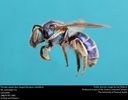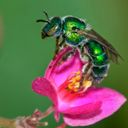Augochloropsis
Augochloropsis
Classification
- Phylum: Arthropoda
- Subphylum: Hexapoda
- Class: Insecta
- Order: Hymenoptera
- Family: Halictidae
- Subfamily: Halictinae
- Tribe: Augochlorini
- Genus: Augochloropsis
Pronunciation
How to pronounce Augochloropsis: /ɔːɡoʊklɔːˈrɒpsɪs/
These audio files are automatically generated. While they are not always 100% accurate, they are a good starting point.
Images






Summary
Augochloropsis is a genus of metallic, often brightly colored sweat bees within the Halictidae family, characterized by diverse social behaviors and a broad diet across various floral types, predominantly located in the New World.
Physical Characteristics
Species of the genus Augochloropsis are generally between 8 and 12 mm long and exhibit bright green or blue metallic colors, with some varieties being gold, red, or purple. They exhibit a strong carina on the pronotal lobe and D-shaped, inwardly bent tegulae.
Identification Tips
Differentiated from other Augochlorini by punctate, D-shaped tegulae that are bent inwards.
Habitat
Augochloropsis nests are typically found in soft ground, with a burrowing structure consisting of a long main burrow leading to lateral burrows.
Distribution
The genus is restricted to the New World, predominantly in tropical and subtropical regions, with three species found in temperate regions of North America.
Diet
Augochloropsis is polylectic, collecting pollen from various plant families, with associations known to include Hypericum and several other genera like Baccharis and Helianthus.
Life Cycle
Some species exhibit multiple generations per year, with different life history traits influencing their polylectic behavior.
Reproduction
The social structures range from solitary to communal, semisocial, and eusocial nesting behaviors, displaying variability in reproductive roles among nest associates.
Predators
Brood parasitism by mutillid wasps and fly family Phoridae, as well as nest invasions by ants.
Ecosystem Role
Pollinators with a broad range of floral associations, contributing to ecosystem services in their habitats.
Tags
- Hymenoptera
- bee
- pollinator
- Halictidae
- Augochloropsis